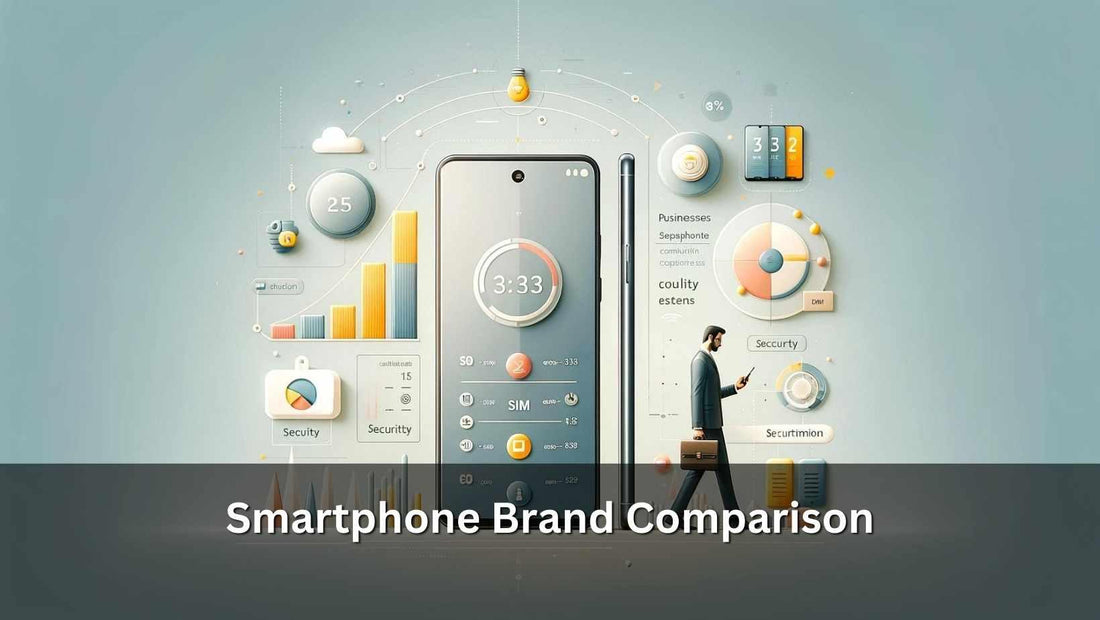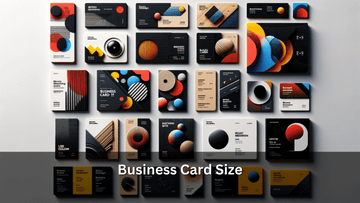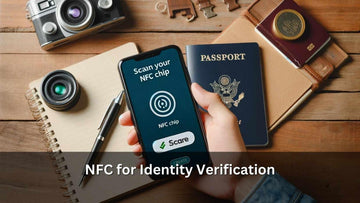Smartphone Showdown: The Best Brand for Business

Introduction
In the dynamic world of business technology, the choice between iPhone and Android smartphones remains a pivotal decision for companies aiming to optimize their operations and enhance employee productivity. This comparison delves into the critical aspects that distinguish these platforms, from user experience and security features to app ecosystem and device management capabilities.
As businesses seek to leverage mobile technology to its fullest potential, understanding the nuances between iPhone and Android devices becomes essential. This article aims to provide a comprehensive overview, aiding in an informed decision-making process that aligns with organizational needs and preferences.
Key Benefits of Company Smartphones
iPhone for Business: Advantages
iPhones are highly regarded in the corporate world for their robust security features, including regular updates and secure ecosystem, which significantly reduce the risk of malware and data breaches.
The seamless integration with other Apple devices enhances productivity, allowing for a unified and efficient workflow. Additionally, iPhones offer a premium user experience with their intuitive interface, making them a preferred choice for executives and employees alike. The App Store's stringent app vetting process further ensures that business applications are reliable and secure, making iPhones a solid choice for organizations prioritizing data protection and user satisfaction.
Android for Work: Benefits
Android phones stand out in the professional setting for their flexibility and customization options. The open-source nature of the Android platform allows businesses to tailor devices to their specific needs, from custom apps to personalized user interfaces. Moreover, Android devices are available in a wide range of models and specifications, accommodating various budgets and preferences.
The platform's extensive app ecosystem enables businesses to leverage a vast array of tools and applications, enhancing operational efficiency. With features like multi-user support and manageability through Google’s Android Enterprise, Android phones offer a versatile and cost-effective solution for companies looking to empower their workforce with mobile technology.
Performance Battle: iPhone vs. Android
Battery Life Comparison
When it comes to battery life, the debate between iPhone and Android devices is extensive. iPhones are renowned for their efficient power management, providing consistent performance throughout the day under standard usage conditions.
However, Android devices offer a wide range of battery capacities, with some models boasting larger batteries that can outlast their iPhone counterparts, especially in models designed for heavy use or gaming. The choice between the two often boils down to usage patterns and the specific model, as Android's diversity includes both high-endurance models and those with more modest battery life.

Processing Power
The processing power of a smartphone is crucial for business applications that demand quick, efficient performance. iPhones, with their proprietary A-series chips, are optimized for the iOS ecosystem, delivering smooth and fast operation even under heavy workloads. Android phones, on the other hand, use a variety of processors from manufacturers like Qualcomm and Samsung, offering a range of performance levels.
High-end Android devices can rival or even surpass iPhones in raw processing power, but the overall performance also depends on the optimization of the Android OS for the specific hardware.
Camera Tech for Business Needs
Camera technology is increasingly important in smartphones for business, not just for capturing high-quality photos but also for document scanning and video conferencing. iPhones are celebrated for their superior camera software, producing excellent photo and video quality that's consistent across models.
Android phones offer a wide variety of camera experiences, with high-end models featuring advanced camera systems that provide versatility and high-quality outputs. For businesses relying on visual content or frequent video communication, both ecosystems offer compelling options, with the choice often influenced by specific needs and preferences for image and video quality.
Top Smartphone Brands for Businesses
The landscape of smartphones for business use is diverse, offering a range of features tailored to various professional needs. Here's a look at what some of the top brands bring to the table for companies.
Apple
Apple's iPhone is synonymous with premium build quality, a secure ecosystem, and seamless integration with business applications. Its focus on privacy and data security makes it a top choice for industries handling sensitive information, offering robust support for enterprise needs through iOS's extensive app ecosystem and management tools.
Samsung
Samsung leads with its versatile range of Galaxy smartphones, known for their cutting-edge technology and adaptability to business environments. Offering Knox security for corporate data protection, Samsung devices cater to a broad spectrum of business functionalities, from mobile productivity to fieldwork, supported by a wide Android app selection.
Nokia
Nokia, with its Android-powered smartphones, emphasizes durability and reliability. Its devices are designed for businesses looking for long-term value, offering a clean, stock Android experience, regular updates, and robust build quality. Nokia phones are ideal for organizations prioritizing ease of use and security.
Xiaomi
Xiaomi provides cost-effective solutions without compromising on performance. With a strong presence in emerging markets, Xiaomi phones are equipped with high-end specs at competitive prices, making them suitable for startups and businesses looking to maximize their tech budget while still accessing powerful tools and features.
Google's Pixel phones offer the purest Android experience, with direct updates from Google ensuring the latest in security and features. Ideal for businesses that prioritize speed and efficiency, Pixel phones also come equipped with cutting-edge AI and machine learning capabilities for smart business operations.
OnePlus
OnePlus stands out for its high-performance devices that rival premium smartphones at a lower cost. Known for their speed, sleek design, and OxygenOS's clean interface, OnePlus phones cater to businesses needing high efficiency and productivity, alongside fast charging and robust performance.

The Verdict on Dual SIM for Business
Conclusion
The exploration of smartphone brands for business use highlights the distinct advantages and considerations of iPhone and Android devices. iPhones offer a streamlined ecosystem and security features ideal for businesses prioritizing data protection and user experience. Android phones, with their diverse hardware options and customization, cater to a wide range of business needs and budgets. Performance metrics such as battery life, processing power, and camera capabilities are crucial, with each brand presenting its strengths.
Dual SIM functionality emerges as a game-changer for global business communication. In selecting the best smartphone brand for your business, consider your specific operational requirements, security needs, and budget constraints to make an informed decision that aligns with your company's objectives and enhances productivity.
We at NFC Tagify provide all sort of NFC Solutions or you may contact us: Tel. 01600800080, Email: info@nfctagify.com







